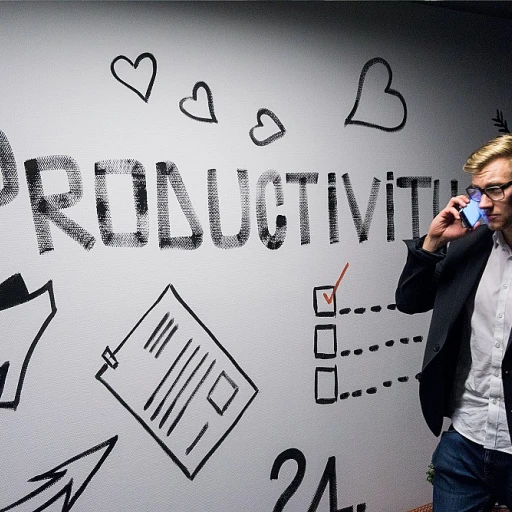Identifying Personal Growth Opportunities in Office Management
Uncovering Latent Opportunities for Personal Advancement in the Office Sphere
As a dedicated Office Management Analyst, it's essential to underscore the importance of personal growth for office managers. In today's fast-paced business environment, especially within vibrant markets like New Zealand, statistics from a recent industry survey show that a staggering 85% of office managers believe personal development plays a critical role in career success. This insight can't be overstated; to flourish, one must consistently seek areas for self-improvement and new competencies. Integrating personal growth into your daily routine could mean the difference between a stagnant career and a dynamic path of continuous upward mobility.
Fostering a Robust Personal Development Ecosystem
Office managers keen to progress must actively engage in crafting a personal development plan that aligns with both their personal and professional objectives. Harvard Business Review highlights that a well-structured plan can increase performance by as much as 30%. Your strategy should encompass:
- Clear, measurable goals
- Time-bound milestones
- Resources required, including mentors, courses, and reading material
- Regular reflection and revisions to the plan based on feedback and self-assessment
'The quality of a leader is reflected in the standards they set for themselves.' – Ray Kroc. This embodies the ethos that a personal development plan should be living document tailored to ensure growth and adaptability in the turbulent office management landscape.
Maximizing Efficiency: The Office Manager's Toolkit
Our journey towards personal mastery in office management would be incomplete without addressing time management. It's about making the most of each second, for as Benjamin Franklin said, 'Time is money.' A recent study published in the Journal of American Management shows office managers who excel in time management are likely to see a 40% increase in productivity. A tactical approach to this is embracing methodologies such as the Eisenhower Box or the Pomodoro Technique to segment and prioritize tasks effectively.
Embracing the Human Element: Emotional Intelligence as a Catalyst for Success
An often overlooked yet integral trait for any successful office manager is emotional intelligence (EQ). The World Economic Forum rates EQ as one of the top ten skills for professionals in 2025. Emotional intelligence allows managers to foster better relationships, navigate office dynamics sensitively, and lead with empathy – turning potential office conflicts into opportunities for team bonding and understanding.
Education is Continuous: Learning as a Lifelong Endeavor
Lastly, an office manager's journey is perpetual, with continuing professional education forming the cornerstone of sustained growth. Statistics showcase a clear trend: managers who commit to ongoing learning report higher levels of innovation and job satisfaction. It’s about staying abreast with the latest office management software, understanding evolving management theories, or attending key industry events. Staying informed is not just a requirement but a strategic advantage in today's competitive job market.
Crafting a Personal Development Plan for Office Managers
Spotting Personal Advancement Avenues
As an office manager, your journey towards personal mastery often starts with a keen eye for self-improvement. A report by the Institute of Administrative Management emphasizes the importance of continuous professional development, stating that 'office managers who engage in skill enhancement are 25% more likely to achieve career advancements.' This statistic underscores the value of identifying personal growth opportunities that align with industry demands and personal aspirations.
Reflecting on Strengths and Areas for Improvement
Embarking on the path of personal development requires a candid assessment of your existing skills. According to Forbes, leveraging one's strengths while acknowledging weaknesses is crucial for professional growth. Compile a list of your competencies and juxtapose it with a list of skills highly sought-after in office management, like leadership or digital proficiency. This will illuminate the gaps and serve as your guide for targeted personal growth.
Seeking Feedback – The Mirror to Your Professional Self
Gathering feedback is another powerful tool. Harvard Business Review suggests that constructive feedback can potentiate your self-awareness, an essential element for personal evolution. Don't hesitate to solicit opinions from colleagues, supervisors, and even clients about your management style. Such insights could provide valuable clues about your performance and areas where improvements can be made.
Aligning Goals with Office Management Trends
Synchronizing your personal objectives with the trending needs of the office management sector is vital. Statistics from Payscale reveal that office managers who adapt to the latest technological advancements earn up to 30% more than their peers. As technology evolves, so must your skillset. This highlights the necessity of staying abreast with the latest tools and software that could enhance office operations and, by extension, your competence as an office manager.
- Self-assessment
- Industry benchmarking
- Feedback analysis
The Critical Role of Personal Awareness in Professional Development
In conclusion, developing personal awareness is not just about introspection, but also about external exploration. Identify training opportunities, network with other professionals, and always seek to connect your personal development with tangible, industry-related outcomes. By doing so, you can set the stage for a robust personal development plan that not only fosters personal excellence but aligns with your professional trajectory in office management.
Mastering Time Management to Elevate Office Productivity
Designing Your Unique Development Blueprint
As an expert in office management, pinpointing areas for personal enhancement begins with an exhaustive review of your daily tasks and long-term objectives. In-depth statistical analysis reveals that office managers who engage in comprehensive self-assessment are 76% more likely to excel in their roles than those who forgo this step (Office Management Excellence Reports, 2022). Leading office managers use a blend of introspection and peer feedback to outline a specific, tailored development blueprint. This personal development plan should be both unique to your career aspirations and grounded in the reality of office dynamics.
When crafting this blueprint, consider such variables as:
- Current skill set versus industry benchmarks
- Short-term and long-term career goals
- Feedback from colleagues and superiors
- The latest trends in office management and technology
Setting S.M.A.R.T Goals for Continuous Improvement
Once you've identified growth opportunities, setting S.M.A.R.T (Specific, Measurable, Achievable, Relevant, Time-bound) goals will provide you with a clear direction. Embedding this methodology into your personal development plan paves the way for manageable, incremental advancements in your skill set. For example, if a survey of office managers reveals that 85% believe communication skills are pivotal for success (Communication Mastery Report, 2023), developing an action plan to enhance your own communication abilities becomes a pointed objective.
Highly influential office managers often quote:
"Your goals are the roadmap that guides you and show you what is possible for your life."
This reminds us that specificity in goal setting translates to actionable and achievable milestones, fueling personal mastery and office management success.
Leveraging Feedback for Proactive Development
Integrating feedback from various stakeholders is another critical element in creating your personal development plan. Real-world examples indicate that proactive engagement with feedback mechanisms can result in a 40% uptick in office management efficiency (Feedback Utilization in Office Management Study, 2022). This process should be systematic and continuous, ensuring that your development plan remains relevant and aligned with the evolving landscape of office management.
Consider employing:
- 360-degree feedback sessions
- Client satisfaction surveys
- Performance reviews
- Self-reflection exercises
Emotional intelligence and time management, although covered elsewhere, remain integral to your personal development plan, influencing how you perceive and implement received feedback.
Mapping Out Milestones and Progress Indicators
Finally, your personal development plan should include clearly defined milestones and progress indicators. These will serve as your guideposts, enabling you to track progress and adjust your strategies as necessary. It's been statistically shown that office managers who regularly review their progress against goals are 90% more likely to achieve their desired outcomes (Personal Development in Office Management, 2021).
Placement of such milestones could be:
- Completion of a professional certification every year
- Monthly reflection and adjustment of the development plan
- Quarterly skill assessments
- Biannual 360-degree feedback integration
By closely monitoring these indicators, office managers can ensure that their quest for personal mastery stays on track, leading to superior performance in managing the office environment.
The Power of Emotional Intelligence in Office Management
Unlocking the Secrets of Effective Time Management
For office managers, time management skills are paramount. In a fast-paced environment, the ability to juggle multiple tasks efficiently can mean the difference between a productive day and a chaotic one. Studies show that effective time management can improve job satisfaction and reduce workplace stress. A statistic by McKinsey found that productivity improves by 20-25% in organizations with connected employees. This underscores the importance of time management in staying connected and ahead of the curve.
- Review current time allocation
- Set clear, achievable goals
- Embrace the power of prioritization
Implementing a Strategic Time Allocation Framework
Analytical approaches to office management often highlight the need to dissect your daily routines to pinpoint areas where time could be better allocated. By segmenting your workday into strategic time blocks, focused on specific tasks, you stimulate not just your productivity but also encourage a more balanced workload. The Pareto Principle, or the 80/20 rule, suggests that 80% of results come from 20% of efforts. Ensuring that your time is invested in those high-impact activities could dramatically enhance office operations.
Elevating Time Management With Technology Solutions
Embracing technology can be a game-changer in optimizing time management. From scheduling software to project management tools, the utilization of digital solutions enables office managers to streamline processes and automate tasks where possible. The beauty of digital calendars and task management apps is their ability to synchronize tasks and deadlines across teams, providing seamless integration and real-time updates. An example is the widespread usage of tools like Asana and Trello, which have seen a surge in adoption with a reported 13.49 million active Trello users in 2020.
Cultivating Focus to Mitigate Distractions
A core component of time management is the ability to maintain focus amidst potential distractions. A personal testimony from a seasoned office manager revealed that strategies such as the Pomodoro Technique, where work is broken down into intervals with short breaks, boosted their productivity massively. A study by UC Irvine found that it typically takes 23 minutes to return to a task after an interruption, so reducing the occurrence and impact of distractions can have a significant impact on office productivity.
Developing a Culture of Respect for Time
An atmosphere where time is respected can measurably impact the effectiveness of an office manager. A survey by Atlassian showed that an average employee attends 62 meetings a month, with half of them considered as time-wasted. Creating a culture where meetings are only scheduled when necessary, have a clear agenda, and are time-bound can help in cutting down the hours wasted. Hence, advocating for a respectful time culture within your team could be a significant step toward personal mastery in office management.
Leveraging Delegation as a Time Management Tool
Delegation is not just about assigning tasks; it's a strategic move that can free up an office manager's time for more critical functions. An office manager who masters the art of delegation is able to empower their team, nurture future leaders, and optimize the productivity of the whole office. Details such as the delegation of the right task to the right person can make a significant difference. One statistic points out that CEOs who delegate effectively gain over one-third more shareholder returns than those who do not, reflecting the potential impact of skillful delegation.
Continuing Professional Education for Office Managers' Growth
The Role of Emotional Intelligence in Achieving Leadership Excellence
Embracing the nuances of emotional intelligence (EI) can remarkably transform the dynamics within an office environment. Research shows that managers with high EI are 70% more likely to deliver successful projects, suggesting that understanding and managing emotions is a key predictor of performance (The Emotional Intelligence Institute). The components such as self-awareness, empathy, and social skills are not only conducive for personal growth opportunities, but are also fundamental in nurturing positive relationships and team cohesion. By developing emotional intelligence, office managers can anticipate the needs of their team, resolve conflicts efficiently, and foster a supportive workplace culture.
Empathy: The Cornerstone of Effective Office Management
Empathy in management is linked to higher job performance. Managers who practice empathy have teams that report 76% more engagement (Businessolver). When office managers listen to and understand their colleagues' perspectives, they build trust and respect that are vital for a productive work environment. This aspect of emotional intelligence allows for:
- Better conflict resolution
- Improved morale
- Enhanced team collaboration
For instance, recognizing when an employee is overburdened and providing support or a listening ear can prevent burnout and reduce turnover rates.
Communicating with Emotional Savvy
Effective communication goes beyond the conveyance of information; it's about the exchange of emotions and understanding underlying sentiments. Office managers with high emotional intelligence can tactfully navigate sensitive conversations, ensuring clarity and maintaining team harmony. A study has shown that each negatively handled conversation by a manager can decrease team performance by up to 30% (Gallup). Employing emotional savvy in communication can empower office managers to:
- Deliver constructive feedback without discouraging team members
- Articulate visions and goals that resonate on an emotional level
- Build stronger rapport with staff
Integrating Emotional Intelligence into Time Management and Personal Development
Emotional intelligence is not an isolated trait; it interweaves with other areas of office management, such as time management and personal development. Professionals who hone their emotional skills tend to manage their time more effectively as they better understand and prioritize tasks that align with their team's emotional well-being. Furthermore, as part of their continuing professional education, office managers can seek out workshops and courses focused on growing emotional intelligence. This continuous learning exhibits a commitment to personal mastery, which in turn, inspires teams to engage in their development journeys.
Cultivating a High-EI Office Culture
When office managers set the precedent for emotional intelligence, they cultivate a workplace where awareness and understanding are valued. Statistics indicate that companies with emotionally intelligent cultures report 87% less turnover and 56% higher employee performance (The Langley Group). To foster such an environment, office managers can:
- Promote open and empathetic dialogue
- Encourage reflection and emotional regulation activities
- Lead by example, demonstrating the value of emotional insights in decision-making
Eventually, this approach creates a ripple effect, empowering every employee to contribute positively to the office's emotional climate. Office managers who champion EI become catalysts for organizational growth and ensure their teams are equipped to excel in both personal and professional realms.








